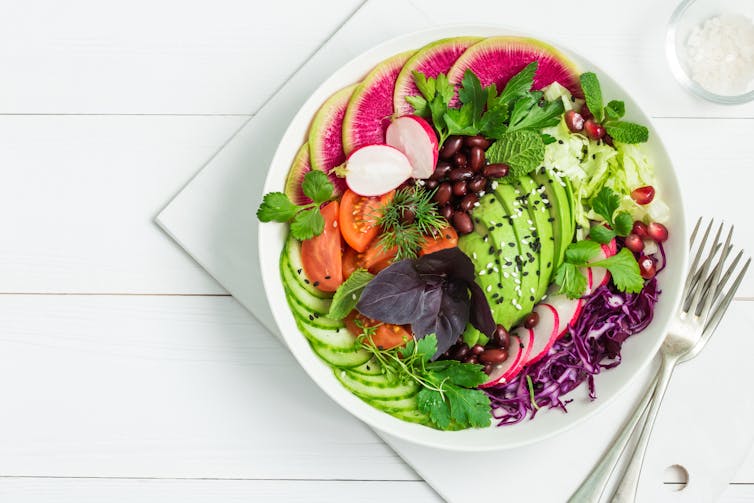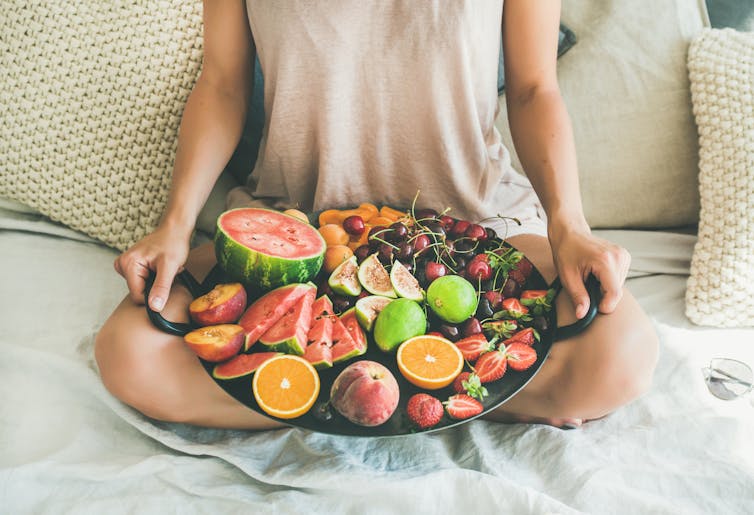Raw vegan diet may be a risk to your health – here’s why
filter
Laura Brown, Senior Lecturer in Nutrition, Food, and Health Sciences at Teesside University provides an informative insight on nutritional concerns of the raw vegan diet. In her article, she refers to reduced and missing nutrients including antioxidants in the raw vegan diet. Antioxidants are nutrients that help protect the body against damage. Lycopene and beta-carotene are two antioxidants found in plant foods.
She mentions that lycopene content increases upon cooking. When tomatoes are cooked in oil, their lycopene content increases by 80% [2]. This is exciting because lycopene has important brain protective benefits. Its helps fight oxidative stress and inflammation in the brain. It supports brain cells’ growth and protects energy-producing areas in the cells [3].
She also mentions increases in beta-carotene upon cooking. Cooked sweet potatoes have 1.5 times more beta-carotene than raw ones [4], and stir-fried carrots have 6.5 times more beta-carotene than raw ones [5]. Beta-carotene was found to improve verbal memory and performance on cognitive tests [6]. Promising research proposed its benefits in helping fix the damage and protecting the brain against Alzheimer’s disease [7].
Laura notes that raw vegans have a high risk of deficiencies of Vitamin B12 and zinc. These are indispensable to brain health.
Adequate Vitamin B12 levels are needed to preserve memory and protect against cognitive decline in old age [8]. High levels of homocysteine (harmful compound) that accumulates due to vitamin B12 deficiency is associated with decrease in brain size and increased risk of dementia [9]
Zinc has an important place in brain health [10]. It is an activator of many chemical reactions in the brain and involved in production of new brain cells. It is part of the defence system in the brain and helps in communication between brain cells. Deficiency of zinc is known to affect learning and memory. You can read Laura’s article published in The Conversation below:
Raw vegan diet may be a risk to your health – here’s why

Vegan diets have become increasingly popular over the years, especially among people looking to improve their health. Indeed, a growing body of evidence shows that plant-based diets (including vegan diets) can have many benefits for health, and have been linked to lower heart disease risk alongside decreased body weight and cholesterol levels.
However, some people are taking the vegan diet to the extreme, choosing only to eat raw plant foods that can be consumed without any cooking. Some also exclude foods that have been changed from their natural form or processed (such as oat or almond milk).
Proponents of this diet claim that cooking causes ingredients to lose some of their important nutrients and enzymes. By consuming raw plant foods, they believe the diet will improve energy levels, prevent (and even reverse) disease and improve overall health.
But research suggests that raw vegan diets, if followed for a long time, may cause more harm than good. Here’s why:
You may miss out on important nutrients
Research does suggest that some raw foods may be healthier than cooked foods. For example, cooking causes brussels sprouts and red cabbage to lose as much as 22% of their thiamine content. This is a form of vitamin B1 which keeps the nervous system healthy.
Though some vegetables may lose nutrients during cooking, others have a greater nutrient content when cooked. This is because some nutrients are bound within the cell walls of the vegetables. Cooking breaks the cell walls down, allowing the nutrients to be released and more readily absorbed by the body.
For example, when spinach is cooked, it becomes easier for the body to absorb the calcium is contains. Research has also found that while cooking tomatoes reduces their vitamin C content by 28%, it increases their lycopene content by more than 50%. Lycopene has been associated with a lower risk of a range of chronic diseases including cardiovascular disease, cancer and heart disease. Asparagus, mushrooms, carrots, broccoli, kale and cauliflower are other examples of vegetables that are more nutrient-dense when cooked.
Cooked vegetables can also supply the body with more antioxidants. These are molecules that can fight against a type of harmful molecule known as free radicals, which can damage cells and may lead to disease over time. Some vegetables (including asparagus, mushrooms, spinach, tomatoes and broccoli) contain higher levels of the antioxidants beta-carotene (which the body turns into vitamin A), lutein and lycopene when cooked than they do when raw.
Vitamin and mineral deficiencies are likely
Raw vegan diets are likely to lack many important vitamins and minerals – namely vitamins B12 and D, selenium, zinc, iron and two types of omega-3 fatty acids. This is because many of the foods that contain high levels of these vitamins and minerals come from animals – such as meat and eggs. These vitamins all play a key role in the structure, development and production of brain and nerve cells, alongside supporting a healthy immune system.

Of particular concern are vitamin B12 levels. A study on people who followed strict raw food diets found that 38% of participants were deficient in vitamin B12. This is concerning, especially given vitamin B12 deficiency is associated with a range of problems, including jaundice, mouth ulcers, vision problems, depression and other mood changes.
The same study also found that a strict, raw vegan diet increased levels of homocysteine (an amino acid broken down by vitamin B12) because of B12 deficiency. This is a concern as increased homocysteine levels can potentially increase the risk of cardiovascular disease and stroke.
May lead to loss of periods
If not planned correctly, the raw vegan diet may lead to unintentional weight loss if you aren’t consuming the amount of calories your body needs to function. This is particularly concerning for young women.
Researchers have found that 30% of women under 45 who followed a raw food diet for more than three years had partial to complete amenorrhea (absence of menstruation). This is likely because of weight loss caused by the raw vegan diet. Amenorrhea can cause a range of issues, including infertility, as well as reduced bone mineral density and osteoporosis. Other studies have also shown that young women who consume 22-42% fewer calories than required were at greater risk of suppressed reproductive function.
While following a plant-based diet can have many benefits for health, the raw vegan diet may potentially be taking things a bit too far and may come with even greater risks if not followed carefully. If you are planning to do a raw vegan diet, it’s important to plan carefully to ensure you are consuming all the nutrients you need for optimal health, in the required amounts. I also wouldn’t recommend following it for a long period of time because of the many risks it may have.![]()
Laura Brown, Senior Lecturer in Nutrition, Food, and Health Sciences, Teesside University
This article is republished from The Conversation under a Creative Commons license. Read the original article.
- https://theconversation.com/raw-vegan-diet-may-be-a-risk-to-your-health-heres-why-193495
- Fielding, J. M. et al. (2005). Increases in plasma lycopene concentration after consumption of tomatoes cooked with olive oil. Asia Pacific journal of clinical nutrition, 14(2), 131–136.
- Crowe-White, K. M. et al. (2019). Lycopene and cognitive function. Journal of nutritional science, 8, e20.
- Buratti, S. et al. (2020). Influence of Cooking Conditions on Nutritional Properties and Sensory Characteristics Interpreted by E-Senses: Case-Study on Selected Vegetables. Foods (Basel, Switzerland), 9(5), 607.
- Ghavami, A. et al. (2012). The effect of food preparation on the bioavailability of carotenoids from carrots using intrinsic labelling. The British journal of nutrition, 107(9), 1350–1366.
- Davinelli, S. et al. (2021). Carotenoids and Cognitive Outcomes: A Meta-Analysis of Randomized Intervention Trials. Antioxidants (Basel, Switzerland), 10(2), 223.
- Hira, S. et al. (2019). β-Carotene: A Natural Compound Improves Cognitive Impairment and Oxidative Stress in a Mouse Model of Streptozotocin-Induced Alzheimer's Disease. Biomolecules, 9(9), 441.
- Tangney, C. C. et al. (2011). Vitamin B12, cognition, and brain MRI measures: a cross-sectional examination. Neurology, 77(13), 1276–1282.
- Jatoi, S. et al. (2020). Low Vitamin B12 Levels: An Underestimated Cause Of Minimal Cognitive Impairment And Dementia. Cureus, 12(2), e6976.
- Choi, S., Hong, D. K., Choi, B. Y., & Suh, S. W. (2020). Zinc in the Brain: Friend or Foe?. International journal of molecular sciences, 21(23), 8941.


 alertness
alertness
 cognition
cognition
 sleep
sleep
 wellbeing
wellbeing
Leave a comment
Open tab